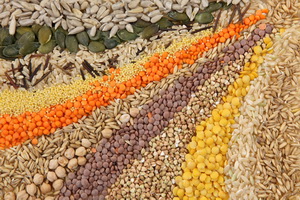
Experts Review Social and Economic Impacts of Biofortification through Biotech
August 1, 2018| |
 Biofortification of crops through genetic modification can effectively lessen the burden of micronutrient deficiencies in an economically viable way. This is according to review article authored by economics and policy experts from the International Rice Research Institute (IRRI), Ghent University, and European Commission and published in Current Opinion in Biotechnology.
Biofortification of crops through genetic modification can effectively lessen the burden of micronutrient deficiencies in an economically viable way. This is according to review article authored by economics and policy experts from the International Rice Research Institute (IRRI), Ghent University, and European Commission and published in Current Opinion in Biotechnology.
Matty Demont, Senior Economist at IRRI, presented the highlights of their review article during the The Economics of Biotech Crops: A Symposium to Promote Economic and Financial Literacy symposium held on July 17, 2018 at the SEARCA Umali Auditorium, Los Baños, Laguna, Philippines.
According to Demont, biofortification complements current interventions to address micronutrient deficiency such as supplementation, industrial fortification of food products, and dietary diversification. Biofortification is generally a beneficial option because of its long-term cost-effectiveness, and the potential to reach the underserved, rural populations, especially in areas with high burden of hidden hunger. To date, there are several research on using GM to biofortify food crops such as the Golden Rice project, however, no GM biofortified crop is available in the market. They analyzed the consumers' willingness to pay for such products in case they become commercially available and concluded that consumers are willing to pay more for biofortified products when direct consumer benefits are presented to them.
Read the abstract from Current Opinion in Biotechnology.
| |
Biotech Updates is a weekly newsletter of ISAAA, a not-for-profit organization. It is distributed for free to over 22,000 subscribers worldwide to inform them about the key developments in biosciences, especially in biotechnology. Your support will help us in our mission to feed the world with knowledge. You can help by donating as little as $10.
-
See more articles:
-
News from Around the World
- Genetically Modified Rice Can Neutralize HIV
- Biotech Discussed at National Plant Variety Protection Dialogue in Uganda
- Nigeria Registers Biotech Cotton Varieties for Access to Farmers
- USDA-APHIS Releases Assessment Documents of GE Low Gossypol Cotton for Public Comment
- AgResearch Tests GM High Metabolizable Energy Ryegrass
- Experts Review Social and Economic Impacts of Biofortification through Biotech
- Researchers Discover How Plants Respond to Attacks
- Rice with Less Stomata Needs Less Water; Better Suited for Climate Change
-
Research Highlights
- Researchers Find Gene Related to High-Oil Content in Oil Palm
- Differences in Coffee Quality may be Explained by the Gene Expressions in Coffee Bean During Ripening
- Co-Expression of ApGSMT2g and ApDMT2g Enhances Salt Tolerance in Cotton
-
Beyond Crop Biotech
- University of Adelaide Researchers Uncover Barley's Brewing Secrets
- C4 Photosynthesis Gene Discovered in Foxtail Millet
- Transcription Factor Genes Increase Biomass Production in Switchgrass
-
From the BICs
- PABIC Organizes SciCom and Policy Making Lecture
-
Plant
- CRISPR Nucleases Evaluated for Genome Editing in Maize
- Researchers Discover Regulator of Endosperm Development in Rice
- Epigenetic Basis of High Regeneration Ability of an Elite Cotton Genotype Jin668
-
Read the latest: - Biotech Updates (February 11, 2026)
- Gene Editing Supplement (January 28, 2026)
- Gene Drive Supplement (February 22, 2023)
-
Subscribe to BU: - Share
- Tweet
